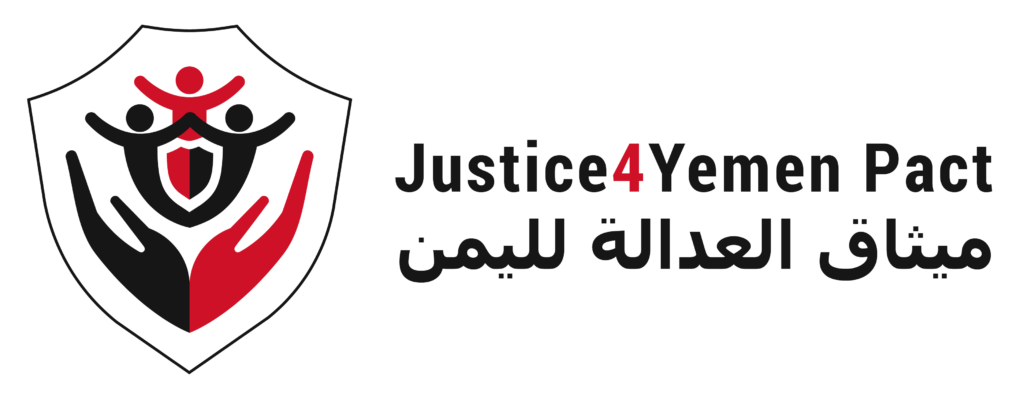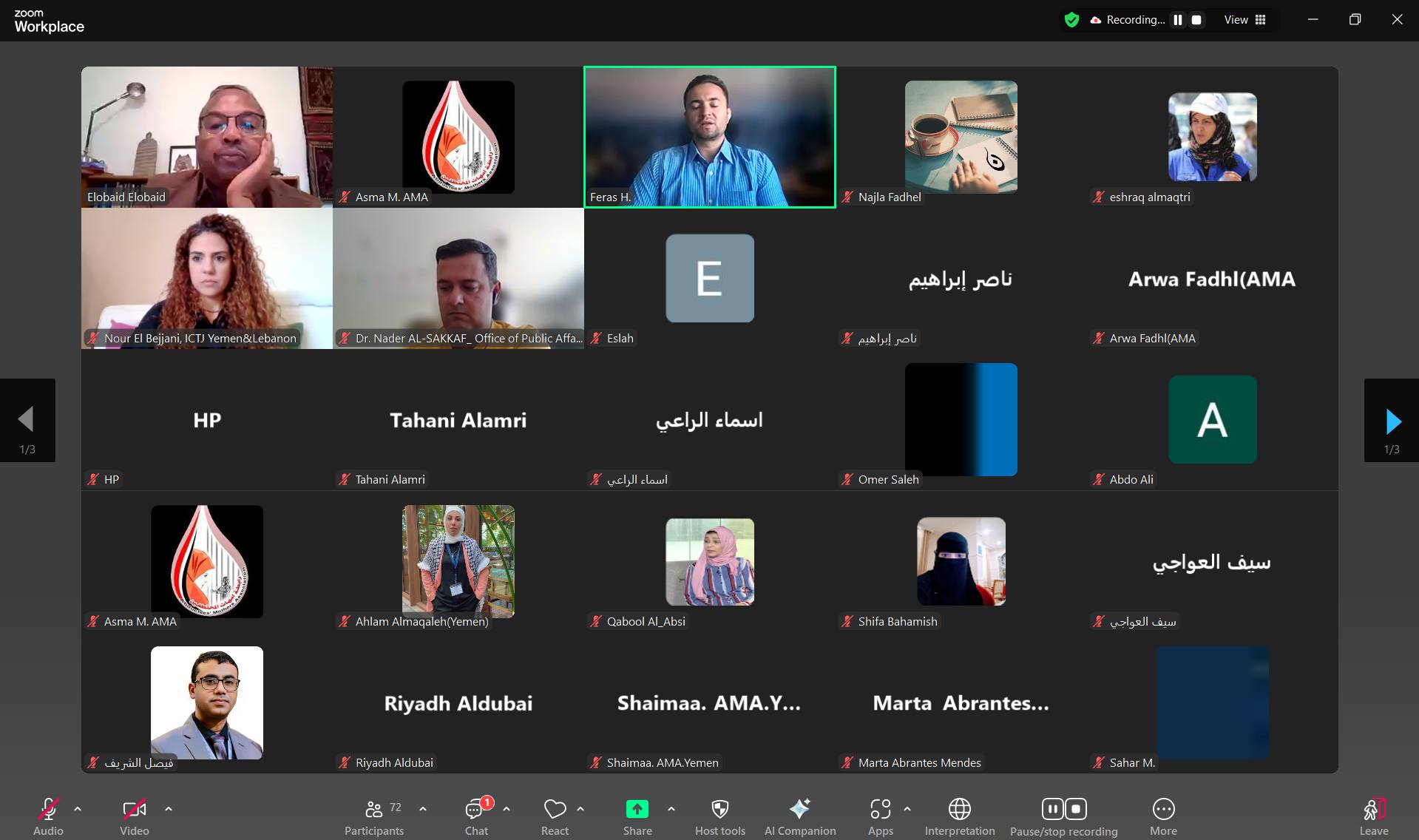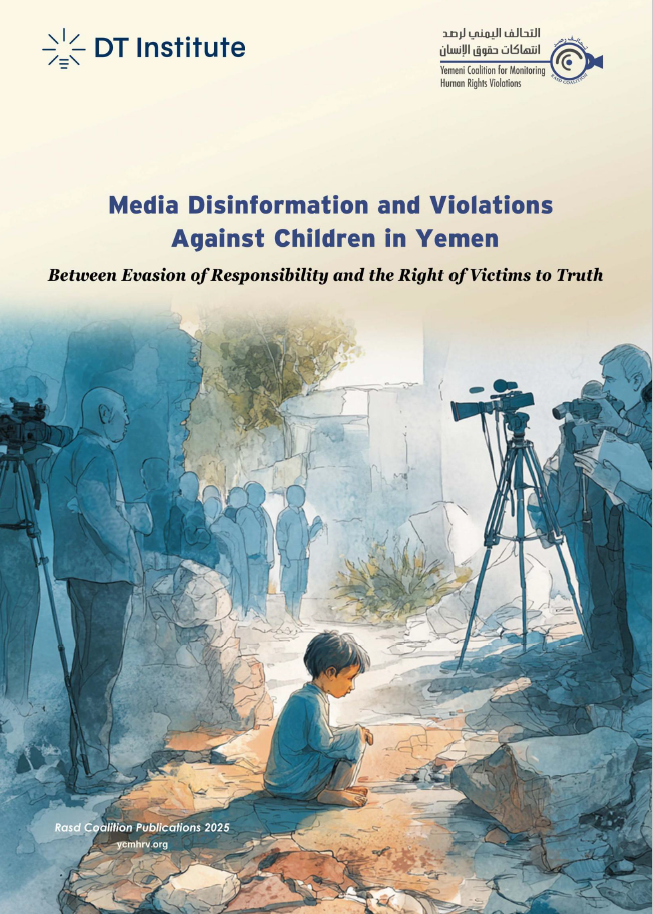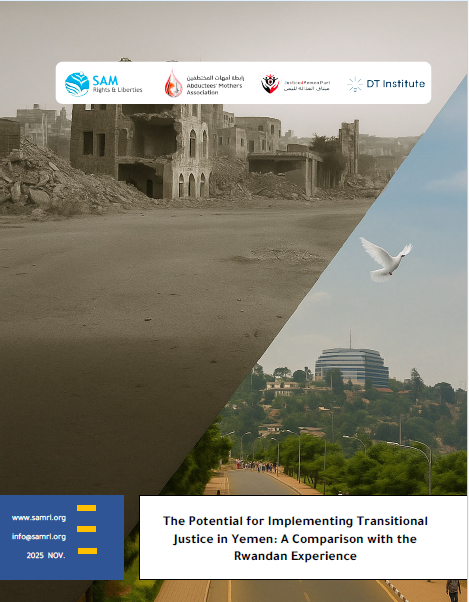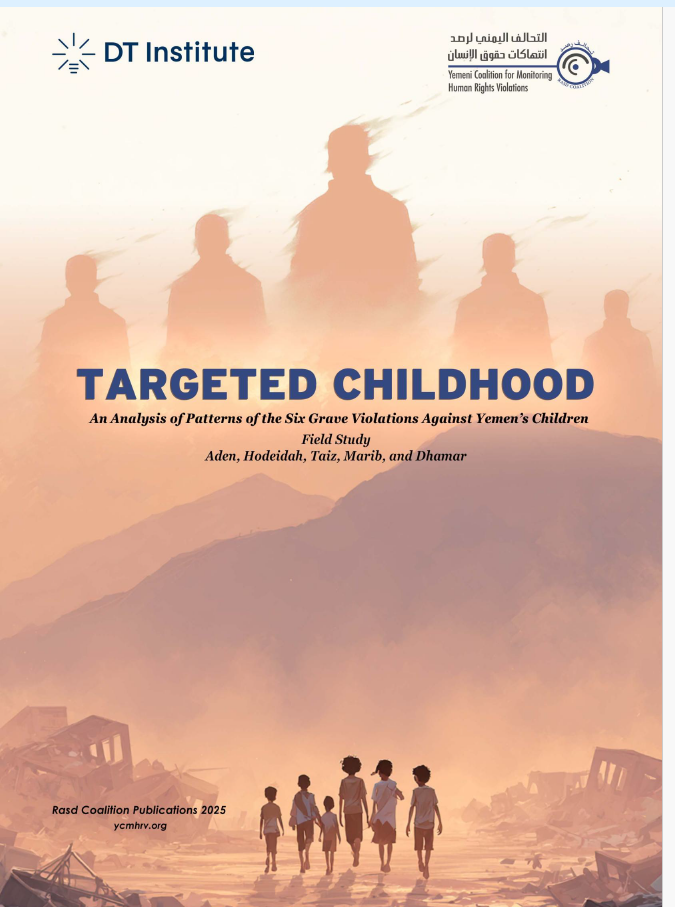On 18 August, Yemen witnessed the launch of the Transitional Justice (TJ) Ambassadors Forum, a milestone initiative aimed at placing victims and survivors at the heart of transitional justice efforts. The forum was launched under the SPARK project supported by the DT Institute, in cooperation with SAM Organization for Rights and Liberties and the Abductees’ Mothers Association (AMA).
The event received wide interest from more than 70 attendees, including civil society representatives, activists, victims, and survivors, underscoring the urgency of advancing transitional justice in Yemen. Eshraq Al Maqtari from the National Commission to Investigate Alleged Violations of Human Rights (NCIAVHR), who moderated the session, welcomed the initiative as a timely and needed space to bring diverse voices together.
Participants stressed that victims and survivors cannot remain sidelined in transitional justice discussions. Instead, their experiences and voices must directly shape Yemen’s justice mechanisms. One participant reflected:
“I believe the Forum will leave a strong mark on the future of transitional justice and victims in Yemen, and will make a unique contribution in supporting victims and conveying their voices.”
Another participant added:
“What is remarkable is the broad partnership from everyone, without exception… This is an important starting point toward consensus and participation..”
Comprehensive Reparations and Lasting Change
Forum participants underscored that reparations must go beyond financial compensation to include material, moral, individual, and collective measures, restoring dignity and addressing the deep harm suffered by victims. These, they emphasized, are not privileges but inalienable rights guaranteed under international law.
Nour El Bejjani from ICTJ Yemen highlighted that transitional justice can and should be pursued even during conflict, explaining that the ICTJ has supported such processes in other protracted crises. She stressed that TJ should be understood as a long-term system of change—a framework to rebuild trust in institutions, prevent recurrence of violations, and lay the foundation for sustainable peace.
Inclusion Beyond Symbolism
Speakers emphasized that victims of Yemen’s war have endured violations committed by multiple parties to the conflict. Their diverse perspectives are therefore indispensable to any genuine TJ process. However, this requires capacity building and empowerment—particularly for women and youth—so that their participation is substantive, not symbolic.
Amat Al-Salam Al-Hajj, Chairperson of the Abductees’ Mothers Association and recipient of the International Women of Courage Award, described the forum as a “dream come true” and an independent platform aimed at paving the way toward peace grounded in justice. She stressed: “Peace will come, sooner or later, but it must be accompanied by transitional justice that redresses victims and holds perpetrators accountable.”
Al-Hajj emphasized that the forum would serve as a unifying space for victims, activists, experts, and decision-makers to promote accountability and advance reconciliation. The Abductees’ Mothers Association also presented the forum’s vision and objectives, aspiring to “a Yemen that recovers from the tragedies of the past through a process of transitional justice that ensures fairness for victims and reinforces the principle of no impunity.”
As part of this mission, the Forum will implement a series of activities—both online and in person—designed to promote transitional justice principles and contribute to building a roadmap for transitional justice in Yemen. These efforts will combine awareness-raising, capacity building, and policy engagement to ensure victims’ voices remain at the center of reform.
The Forum was recognized as a safe and structured platform for dialogue, where victims and survivors can strengthen their voices, build alliances, and influence national and international policy discussions.
Role of Civil Society
Civil society organizations were described as crucial intermediaries that bridge victims with institutions and policymakers, amplify their demands, and help ensure accountability frameworks remain victim-centered. CSOs, together with donors and the international community, were urged to exert pressure so victims’ participation moves from rhetoric to practice.
Feras Hamdouni, Yemen Senior Programs Manager at the DT Institute, highlighted the crucial role that the J4YP coalition plays in documentation and in preserving victims’ rights. He emphasized that the relationship between victims and civil society by saying:
“When we talk about transitional justice and human rights, we are dealing with many actors: governments, de facto authorities, political forces, regional parties, the international community, victims and survivors, and civil society organizations. Most of these actors, by their nature or their affiliations—often have conflicting interests. Political parties may prioritize their own agendas over victims’ needs; governments or de facto authorities may favor political stability over truth and accountability; even regional or international actors may advance their agendas at the expense of victims’ priorities. The only exception, in my view, is the relationship between victims and survivors on the one hand, and civil society organizations on the other. This relationship is not based on conflicting interests but on a complete convergence around one goal: achieving justice, redressing victims, and preventing the recurrence of violations. This is why I believe the role of civil society and human rights organizations is the most genuine and indispensable in supporting transitional justice—because it begins with victims and exists for their sake, not for political calculations or narrow interests.“
Building Skills and Knowledge
The event also highlighted the impact of the SPARK training program, which many participants credited with giving them practical skills and knowledge to engage in transitional justice work. Since training materials are publicly available, they continue to serve as tools for victims and survivors beyond the program itself, creating a multiplier effect in capacity building.
A Call to Action
Participants emphasized that victim participation must take place on two interconnected levels: first, by ensuring victims are heard—through the sharing of their lived experiences and documented violations—and second, by guaranteeing their active role in shaping and monitoring transitional justice processes. This includes involvement in drafting accountability mechanisms and meaningful representation in truth and reconciliation commissions, where victims should hold at least one-third of the seats to secure real influence and veto power.
“The victims of Yemen are not just numbers in reports or cases in archives. Transitional justice cannot be effective unless it begins with listening to victims, understanding their needs, and putting their rights at the forefront,” said Elobaid, one of the keynote speakers.
Looking ahead, participants underscored that the credibility and effectiveness of Yemen’s transitional justice process will depend on its ability to place victims not at the margins, but at the very heart of decision-making.

